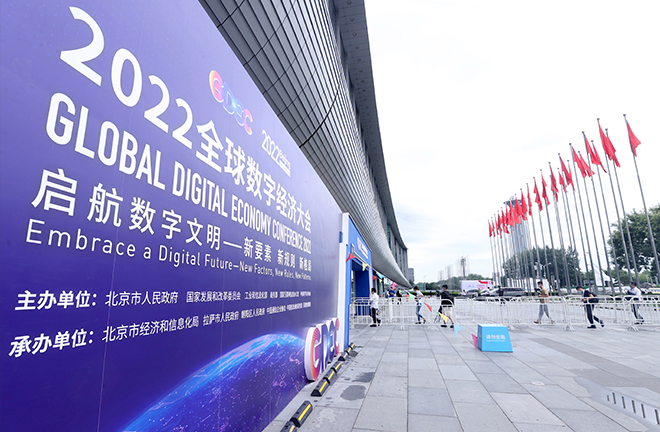Digital economy offers quality employment

The Global Digital Economy Conference in Beijing, July 28th Photo: CFP
Employment is pivotal to people’s wellbeing. Achieving overall stability in employment and higher quality employment reflects the nation’s people-centered development philosophy, which not only helps to raise residents’ income levels and enhance people’s sense of gain and happiness, but also helps to improve uneven income distributions, further narrow the urban-rural income gap, and solidly promote common prosperity.
The digital economy has become the most dynamic and promising economic form in China today, and the four synergies of digital industrialization, industrial digitalization, digital governance, and realizing the data value have not only accelerated the digital transformation of various industries, but also created more employment space and job opportunities, driving various regions’ socioeconomic development. Therefore, it is important to harness the digital economy’s development trend and give full play to the role of the digital economy in promoting employment and improving its quality, in order to realize China’s high-quality economic development.
Higher quality employment
With digital economy’s rapid development, its scale of employment continues to expand, which gives rise to new employment forms and flexible employment models and allows China’s labor market to demonstrate strong resilience.
First, the digital economy’s development is conducive to optimizing the employment structure. Digitalization has shifted the industrial structure’s center to the tertiary industry, driving the labor force to gradually enter tertiary industries. The service-oriented trend in the labor employment structure is significant. Furthermore, the platform economy has provided employment opportunities for low-skilled workers to enter into emerging service industries, which not only optimizes the original employment structure, but also improves employment quality.
Second, the digital economy’s development has promoted innovation and entrepreneurship. The vigorous development of the digital economy, the growth of platform enterprises, the evolution of the new generation of digital information technology have promoted innovation and entrepreneurship. Thresholds for innovation and entrepreneurship have been reduced by support of relevant departments in constructing innovation and entrepreneurship platforms, and the development of financial services such as business guarantees and small loans. New enterprises based on new technologies, products, models, and business forms are emerging.
Third, the digital economy’s development cultivates new jobs. The digital economy has broken temporal and spatial boundaries, formed new employment patterns, created new occupations, and the employment scale of the digital economy has continued to expand. Meanwhile, employment of new technologies has greatly improved production efficiency, and increasing product market demand has also increased enterprises’ labor demand.
Fourth, the digital economy’s development is conducive to opening up new space for employment. The flexibility of the digital economy breaks through employment restrictions of factors such as age and region, bringing a large number of employment opportunities to seniors. New consumer demand has led to an emergence of new employment forms, and more elderly people can flexibly choose emerging digital occupations to rejoin the workforce post-retirement, which not only helps improve living standards for the elderly, but also promotes overall employment quality in China.
New business forms
In the future, it is necessary to develop a variety of measures to accelerate the development of the digital economy and leverage high-quality employment effects of the digital economy.
First, the construction of digital infrastructure should be improved, and the layout of new infrastructure accelerated. Industrial development and sectorial connectivity should be driven by digital technologies. The construction of new infrastructure, such as data centers and 5G networks, should be consistently pursued. Digital productivity should be fully released and China’s digital economy’s overall development should be improved. The advantages of digital economy platforms should be given full play, digital business environments continuously optimized, and stable growth and employment simultaneously achieved.
Next, it is advisable to support industrial digitalization and upgrade the employment structure by optimizing the industrial structure. To build a digital China and promote industrial digitalization, first we need to cultivate new business forms for the digital economy, focus on intelligent manufacturing and other fields, and improve the digital supply chain. Second, it is advisable to actively build industrial big data platforms, and cultivate more new employment forms. Third, traditional manufacturing enterprises should be encouraged to transform to productive service industries through digitalization, and full focus should be given to the employment absorption capacity of the service industry with an “Internet plus employment” model. After this, construction of a digital economy talent training system should be accelerated, and the overall digital skill level of workers should be improved. A wide range of flexible policies and measures to attract talent and encourage innovation should be introduced.
Finally, the social security system should be steadily improved while expanding the coverage of social security. In the future, we need to further improve our social security system, clarify the labor protection responsibilities of platform and start-up enterprises, encourage new employment groups to actively participate in insurance, and also adjust the relevant system rules and platform algorithms at the right time to effectively expand the social security coverage, maximize protection of labor rights and interests of digital economy employees, and play the role of “reservoir” and “stabilizer” for new industry employment.
Sun Jian and Cao Yunchun are from the Zhengzhou Business University.
Edited by ZHAO YUAN
